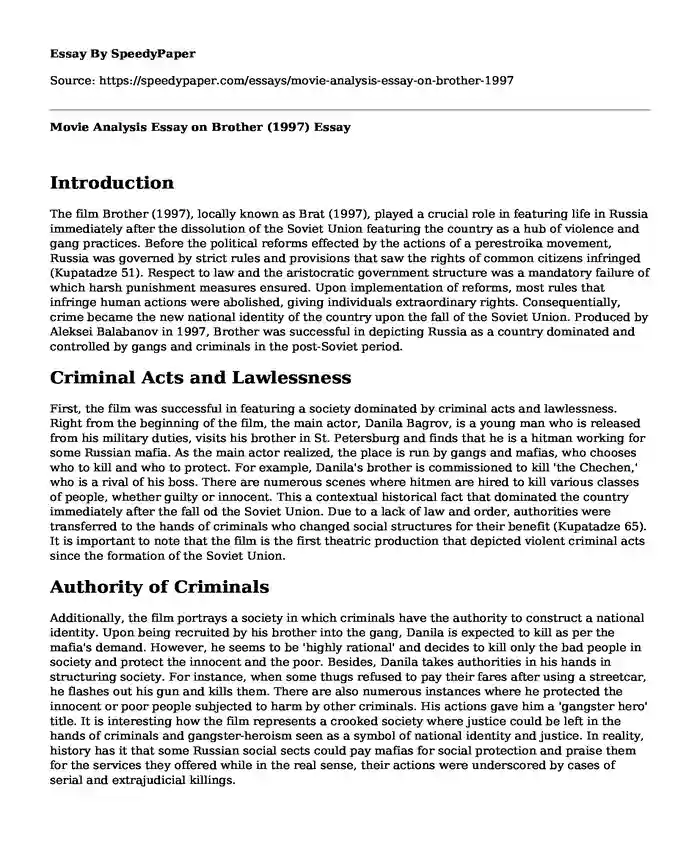
| Type of paper: | Movie review |
| Categories: | Movie |
| Pages: | 3 |
| Wordcount: | 660 words |
Introduction
The film Brother (1997), locally known as Brat (1997), played a crucial role in featuring life in Russia immediately after the dissolution of the Soviet Union featuring the country as a hub of violence and gang practices. Before the political reforms effected by the actions of a perestroika movement, Russia was governed by strict rules and provisions that saw the rights of common citizens infringed (Kupatadze 51). Respect to law and the aristocratic government structure was a mandatory failure of which harsh punishment measures ensured. Upon implementation of reforms, most rules that infringe human actions were abolished, giving individuals extraordinary rights. Consequentially, crime became the new national identity of the country upon the fall of the Soviet Union. Produced by Aleksei Balabanov in 1997, Brother was successful in depicting Russia as a country dominated and controlled by gangs and criminals in the post-Soviet period.
Criminal Acts and Lawlessness
First, the film was successful in featuring a society dominated by criminal acts and lawlessness. Right from the beginning of the film, the main actor, Danila Bagrov, is a young man who is released from his military duties, visits his brother in St. Petersburg and finds that he is a hitman working for some Russian mafia. As the main actor realized, the place is run by gangs and mafias, who chooses who to kill and who to protect. For example, Danila's brother is commissioned to kill 'the Chechen,' who is a rival of his boss. There are numerous scenes where hitmen are hired to kill various classes of people, whether guilty or innocent. This a contextual historical fact that dominated the country immediately after the fall od the Soviet Union. Due to a lack of law and order, authorities were transferred to the hands of criminals who changed social structures for their benefit (Kupatadze 65). It is important to note that the film is the first theatric production that depicted violent criminal acts since the formation of the Soviet Union.
Authority of Criminals
Additionally, the film portrays a society in which criminals have the authority to construct a national identity. Upon being recruited by his brother into the gang, Danila is expected to kill as per the mafia's demand. However, he seems to be 'highly rational' and decides to kill only the bad people in society and protect the innocent and the poor. Besides, Danila takes authorities in his hands in structuring society. For instance, when some thugs refused to pay their fares after using a streetcar, he flashes out his gun and kills them. There are also numerous instances where he protected the innocent or poor people subjected to harm by other criminals. His actions gave him a 'gangster hero' title. It is interesting how the film represents a crooked society where justice could be left in the hands of criminals and gangster-heroism seen as a symbol of national identity and justice. In reality, history has it that some Russian social sects could pay mafias for social protection and praise them for the services they offered while in the real sense, their actions were underscored by cases of serial and extrajudicial killings.
Conclusion
In conclusion, Brother is a film to reckon in explaining how theatric productions picture and address moral values. Its portrayal of criminal acts as the new normal upon the fall of the Soviet Union paints a clear picture of the lack of lawlessness and the transfer of the formal justice protocols to the informal sector characterized by inhumane actions and extrajudicial killings. Apart from the depiction of criminal acts, the sensation created by the movie was that of the actual Russian society characterized by traditional Russian buildings and the new adoption of the Western culture.
Works Cited
Balabanov, Aleksei. "Brat." YouTube, 1997, www.youtube.com/watch?v=m6TXPNybrmk&list=PL0owtzpKsOHGs6zKAGqC6eWpeGjvW_cMs.
Kupatadze, Alexander. "Impact of Soviet and Post-Soviet Organized Crime." Organized Crime, Political Transitions, and State Formation in Post-Soviet Eurasia, 2012, pp. 46-89.
Cite this page
Movie Analysis Essay on Brother (1997). (2023, Sep 11). Retrieved from https://speedypaper.com/essays/movie-analysis-essay-on-brother-1997
Request Removal
If you are the original author of this essay and no longer wish to have it published on the SpeedyPaper website, please click below to request its removal:
- Essay Example about the Effects of Social Media on a Student's Education
- Hong Kong's Culture Through Media, Essay Example
- Social Issues in Arrival - Movie Review Essay Example
- Free Essay: Article Analysis on Video Games
- Paper Example. Promotion Critique
- Paper Example on Memes and Disinformation: Unraveling the Impact on Civic Culture and Social Media Dynamics
- Sexism in Game of Thrones and Attitude to It: Essay Sample
Popular categories




